January 7, 2022
Day 7 of Remembering
The Possibility of Deer, After All
I decided on a walk with Oscar after a healing session with my acupuncturist this morning. A blustery day, the wind whipping the fir trees from top to bottom, crown to trunk. I tied my shoes, grabbed the leash, hooked it up to Oscar’s harness, and checked my watch. 12:12. Rubin time. To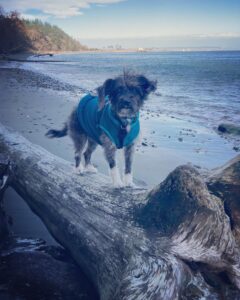 avoid the southwesterly gusts, we headed toward the beach to the north and east where the bluffs would protect us from the wind. Oscar took the lead scouting, as he always does, for deer.
avoid the southwesterly gusts, we headed toward the beach to the north and east where the bluffs would protect us from the wind. Oscar took the lead scouting, as he always does, for deer.
Walking with us is my grief, large and enveloping like a weighty umbrella draped around my shoulders. My only relief is putting one foot in front of the other, feeling the winter wind slap my cheeks and the air, crisp and clean, fill my lungs. Walking has always been my meditation and my medicine. If I cannot move, I cannot shake the sadness that often halos me, a specter of depression – a mix of genetics and loss; anxiety and low self-esteem.
Mostly, I can keep the sadness at bay and have done so for over 20 years since my last dance around the boxing ring of depression. That bout was triggered by a pile of losses — my first dog among them — and a cavernous feeling of unworthiness and grief. I learned then to identify my depression, watch for the signs that warned of its arrival, and developed ways to keep it at arm’s length. Exercise was key and, as I grew older, walking was essential. Walking in nature even more essential.
This grief, the grief of losing my beautiful mother and my beloved dog months apart, feels both 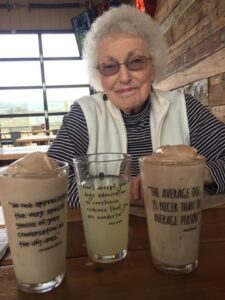 overwhelming and selfish in a world of pandemics and climate catastrophes. Where does a 94 year-old woman taken down by a stroke and a 15 year-old dog succumbing to kidney failure fit among the loss and grief of the past few years?
overwhelming and selfish in a world of pandemics and climate catastrophes. Where does a 94 year-old woman taken down by a stroke and a 15 year-old dog succumbing to kidney failure fit among the loss and grief of the past few years?
Still, I find myself waking in the middle of the night and early in the morning thinking about my mother, lying in her hospice bed, diminishing by the day and the grief feels so heavy, I can barely lift my arms. I think about Rubin, my companion for almost 15 years, and that look in his eyes as the vet gave him the first shot of sedation and my doubt feels as if it will drown me.
In these past few months, I have come to realize grief is both lonely and shared, personal and public; unpredictable and uncontrollable. There are times when the isolation of my thoughts devours me and my public tears embarrass me, when I feel as if no one understands and yet everyone has a similar story. It’s as if I sit in the middle of something that at once feels unique and yet as familiar as the shape of my hands. The paradox envelops me.
As an animal massage therapist, I’ve been in the presence of many dying animals, watching their 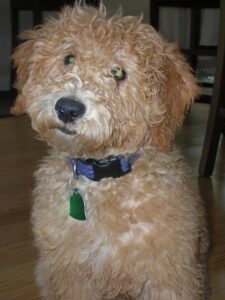 decline, helping to ease their discomfort, and eventually helping them rest. I’ve sat with owners who’ve requested my presence as they said goodbye to their dogs, offered a last massage on the day of euthanasia, and witnessed the tears and grieving of all who loved them. Death hasn’t been a stranger in my life, yet I still struggle to trace the trails of all these tears into a map that feels cohesive and clear, that gives me both guidance and sure-footed direction.
decline, helping to ease their discomfort, and eventually helping them rest. I’ve sat with owners who’ve requested my presence as they said goodbye to their dogs, offered a last massage on the day of euthanasia, and witnessed the tears and grieving of all who loved them. Death hasn’t been a stranger in my life, yet I still struggle to trace the trails of all these tears into a map that feels cohesive and clear, that gives me both guidance and sure-footed direction.
I am not one to share my grief in public, yet here I am trying to navigate its jagged edges with words that fail to fully grasp the topography of the pain.
Living into her 90s, my mother knew well the landscape of loss. She made a habit of reading the obituaries, even of those people she did not know. Weekly she attended memorial services, dressing herself meticulously for the occasion, collecting memorial programs for those who had passed. I asked her once what it felt like to watch so many people she knew die, why she felt compelled to attend the services. My mother, always articulate and thoughtful, told me she liked to hear the stories of their lives, “Their full picture,” she said, “Their accomplishments and the way their loved ones remembered them.” And then she said, “If you can’t get comfortable with loss at my age, you’re not going to last very long.”
She grieved quietly when my father, her husband of over 60 years, died. We all knew it was coming, of course, his battle with Parkinson’s taking him away from us more and more each day, each year. When he eventually died at age 86 and in hospice, his own choosing, my mother 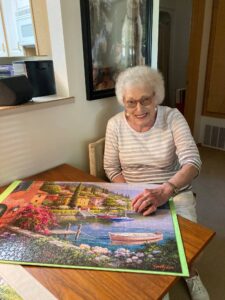 appeared to be all business. She worked every minute of her waking hours organizing his papers, preparing his memorial, packing up his belongings, and donating his books and music, his clothes and his shoes that I worried she’d fall ill with exhaustion. She was driven, in a way, to move through the grief never losing control, never forgetting a detail required to fulfill after someone dies. She joined a grief group that provided her with a workbook, which exactly what my mother needed – a set of assignments to work on until completed. A final ending.
appeared to be all business. She worked every minute of her waking hours organizing his papers, preparing his memorial, packing up his belongings, and donating his books and music, his clothes and his shoes that I worried she’d fall ill with exhaustion. She was driven, in a way, to move through the grief never losing control, never forgetting a detail required to fulfill after someone dies. She joined a grief group that provided her with a workbook, which exactly what my mother needed – a set of assignments to work on until completed. A final ending.
Only on occasion would she share her sadness, letting tears fill her eyes with a memory or with the acknowledgment of his absence. She kept a photo of him on her desk, a photo I’d taken a few years previously, of dad sitting on the deck at my brother’s house one hot summer’s day. He’s wearing a large-rimmed hat, resting his chin on one hand and the other holding a large beer stein. She told me she loved that photo, that she talked to it every night, describing her daily life to him and remembering old 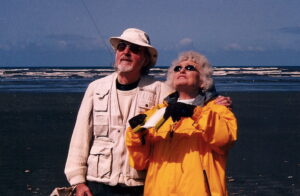 stories of their past. She’d cry sometimes recalling him, but never uncontrollably. Just quiet tears that welled up in her aging eyes. “Oh I cry, alright,” she said one day, “But generally at night and rarely in public.” Why, I’d asked, for which she’d have no answer. “Oh I don’t know, honey,” she’d said, “I guess when it’s quiet, I miss knowing he’s there.”
stories of their past. She’d cry sometimes recalling him, but never uncontrollably. Just quiet tears that welled up in her aging eyes. “Oh I cry, alright,” she said one day, “But generally at night and rarely in public.” Why, I’d asked, for which she’d have no answer. “Oh I don’t know, honey,” she’d said, “I guess when it’s quiet, I miss knowing he’s there.”
I feel the same about my mother. I miss knowing she’s there just as much as I miss knowing Rubin isn’t there, he’s warm body at the foot of the bed, his wagging tail greeting me when I come home, his presence always at the edges of my daily life. When Rubin was gone, when we made the fateful decision to say goodbye, the one person I really wanted to talk to about it with was my mother, yet she was no longer there and that made the grief expand in a way I never knew possible.
In my tiny slice of the world, in this microscopic dot on this expansive map of grief, my losses can feel insignificant at times. I did not lose my mother when we were both younger. She lived an amazingly long and full life, surrounded by family and friends who loved and admired her beyond measure. I did not lose my beloved canine companion at a young age either. He lived almost 15 years and his days were filled with crazy adventures and mountains of love. And yet, they are 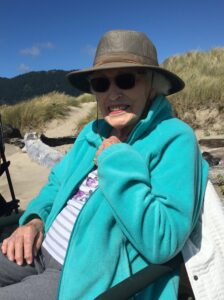 gone too soon and their absence blows through me like the cold wind on this morning’s walk.
gone too soon and their absence blows through me like the cold wind on this morning’s walk.
Oscar was happy to run off leash a bit on the beach. He stayed close to the bluff, sniffing out the otter trails and sorting through the salty debris from last night’s high tide. I stayed by the shore, where the waves bent into curls and raced like streamers along the sand. Whitecaps spread out across the inlet, choppy and unpredictable and the sky felt heavy with the possibility of rain. I am thankful to live where I do, to have such weather that wakens me, enlivens my spirit and blows away some of the sadness and doubt. Oscar is not so sure about the wind, his little body buffeted by mighty gusts. Still, he is willing to walk for as long and as far as I feel the need. There still is the possibility of deer, after all.